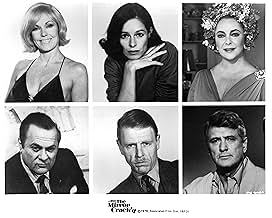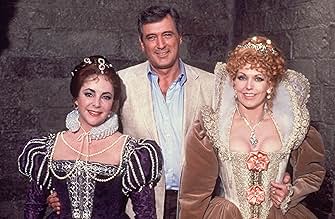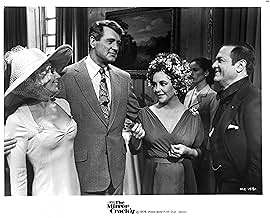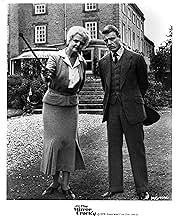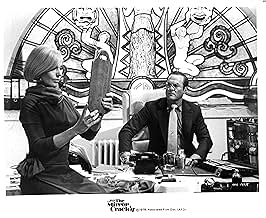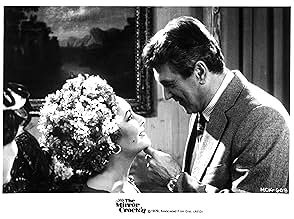IMDb-BEWERTUNG
6,2/10
10.150
IHRE BEWERTUNG
Als eine amerikanische Filmcrew nach St. Mary Mead kommt und eine örtliche Frau vergiftet wird, beschließt Miss Marple der Sache auf den Grund zu gehen.Als eine amerikanische Filmcrew nach St. Mary Mead kommt und eine örtliche Frau vergiftet wird, beschließt Miss Marple der Sache auf den Grund zu gehen.Als eine amerikanische Filmcrew nach St. Mary Mead kommt und eine örtliche Frau vergiftet wird, beschließt Miss Marple der Sache auf den Grund zu gehen.
- Auszeichnungen
- 2 Nominierungen insgesamt
Charles Lloyd Pack
- Vicar
- (as Charles Lloyd-Pack)
Handlung
WUSSTEST DU SCHON:
- WissenswertesAt this time of her career Dame Elizabeth Taylor's career was in the doldrums. She was now 48 years old, hadn't had a decent hit film for several years, her marriage to US politician John Warner was struggling, she was taking anti-depressants and had put on weight. When Rock Hudson was approached to do the film he said he would only do it if his long time friend Taylor could also be cast. The producers had assumed that Taylor's salary demands would put the film well over budget and were lining up Donald Pleasence as a possible alternative to Hudson. However, Hudson said that he could get Taylor to agree to star with him for the same salary he was being offered. Hudson convinced Taylor that coming to England for a few weeks to do a mainstream film with him, Lansbury and Tony Curtis (people Taylor had known for about 30 years) would be beneficial for her mental health plus give her a chance to catch up with old friends who lived there.
- PatzerSet 1953, Marty Fenn drives a 1959 model car.
- Zitate
Marina Rudd: Lola, dear, you know, there are really only two things I dislike about you.
Lola Brewster: Really? What are they?
Marina Rudd: Your face.
- Crazy CreditsOpening credits prologue: 1953
Ausgewählte Rezension
This is the film that launched Angela Lansbury's career as a television sleuth. The character she began playing four years later was much the same as the one she plays here - and it's not Miss Marple. Not that purists have any right to complain. Agatha Christie's Miss Marple isn't really Miss Marple, either. Miss Marple first appeared in "Murder at the Vicarage" (published 1930), and I can't help thinking of the character in that book as the REAL Miss Marple: a transparent, almost pathologically nosy woman who thoroughly enjoyed prying for its own sake, who as capable of solving mysteries because she was unable to rest so long as there was potential gossip she didn't know about. She wasn't a saint, she wasn't an inspired guesser, and she wasn't wise.
Almost immediately, though (in "The Tuesday Club Mysteries", published 1932), Miss Marple transformed into someone who WAS saintly, inspired and, worst of all, wise, and it's this latter, less agreeable Miss Marple that dominates the subsequent novels. What obligation does anyone else have to be authentic, if Agatha Christie herself wasn't? So far as I'm concerned the character is now fair game for any revisionist interpretation whatever; and if so, give me Angela Lansbury's energy over Joan Hickson's "authenticity" any day. ...Strange, then, that the film doesn't really work. The puzzle itself is a real humdinger - one of Christie's very best, in my opinion - and the denouement is handled very well. But there's something bookish and stifled about everything leading up to it. Most Christie adaptations have a similar plodding quality (notable exceptions: Billy Wilder's "Witness for the Prosecution", Sidney Gilliat's "Endless Night", and people who have seen René Clair's "And Then There Were None" think highly of that, too) - there's an AIR of excessive fidelity to the book, even when quite a few details have been changed.
One problem unique to this one is the set of laboured jokes at the expense of 1950s Hollywood - at least, the jokes WANT to be at the expense of 1950s Hollywood, but I think they come from "My Big Book of 1000 One-Liners", or some such.
Almost immediately, though (in "The Tuesday Club Mysteries", published 1932), Miss Marple transformed into someone who WAS saintly, inspired and, worst of all, wise, and it's this latter, less agreeable Miss Marple that dominates the subsequent novels. What obligation does anyone else have to be authentic, if Agatha Christie herself wasn't? So far as I'm concerned the character is now fair game for any revisionist interpretation whatever; and if so, give me Angela Lansbury's energy over Joan Hickson's "authenticity" any day. ...Strange, then, that the film doesn't really work. The puzzle itself is a real humdinger - one of Christie's very best, in my opinion - and the denouement is handled very well. But there's something bookish and stifled about everything leading up to it. Most Christie adaptations have a similar plodding quality (notable exceptions: Billy Wilder's "Witness for the Prosecution", Sidney Gilliat's "Endless Night", and people who have seen René Clair's "And Then There Were None" think highly of that, too) - there's an AIR of excessive fidelity to the book, even when quite a few details have been changed.
One problem unique to this one is the set of laboured jokes at the expense of 1950s Hollywood - at least, the jokes WANT to be at the expense of 1950s Hollywood, but I think they come from "My Big Book of 1000 One-Liners", or some such.
Top-Auswahl
Melde dich zum Bewerten an und greife auf die Watchlist für personalisierte Empfehlungen zu.
Details
- Erscheinungsdatum
- Herkunftsland
- Sprache
- Auch bekannt als
- Agatha Christie's The Mirror Crack'd
- Drehorte
- Shoreham, Kent, England, Vereinigtes Königreich(Shoreham was used to double up as part of the village of St Mary Mead)
- Produktionsfirma
- Weitere beteiligte Unternehmen bei IMDbPro anzeigen
Box Office
- Bruttoertrag in den USA und Kanada
- 11.000.000 $
- Weltweiter Bruttoertrag
- 11.000.000 $
Zu dieser Seite beitragen
Bearbeitung vorschlagen oder fehlenden Inhalt hinzufügen


![Trailer [EN] ansehen](https://m.media-amazon.com/images/M/MV5BNjYzZDFkZTQtOTQ2Ny00OGQ3LTgwNTktOGQ3NGRhOWE2MGYyXkEyXkFqcGdeQXRyYW5zY29kZS13b3JrZmxvdw@@._V1_QL75_UX500_CR0)
